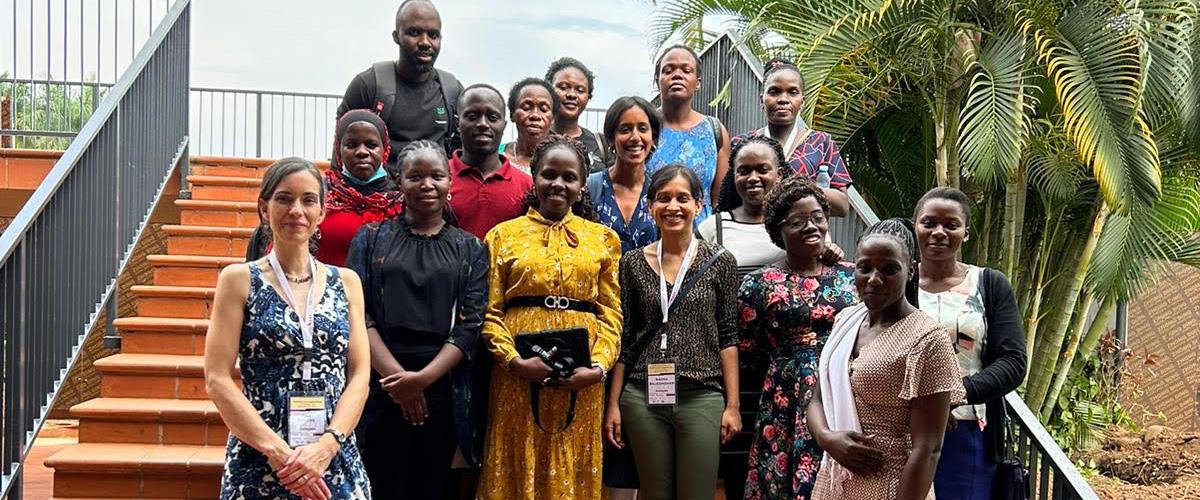Fogarty Feature: A Q and A with Preethiya Sekar
Preethiya Sekar, third from left in the second row, poses with her Fogarty Fellowship team. Sekar was a 2022-23 Fogarty Fellow.
Preethiya Sekar took a year off from medical school to complete a Fogarty Fellowship.
Sekar, a 2022-23 Fogarty Fellow, completed her Fellowship at the Infectious Disease Institute in Kampala, Uganda. Her experience led to two published papers – and additional publications forthcoming – and “supported my growth as a researcher,” she said.
The Fogarty Fellowship is offered by the Center for Global Health and Social Responsibility as part of the NPGH consortium and a grant from the National Institutes of Health Fogarty International Center.
We asked Sekar about her time as a fellow and what she took away from the 12-month program.
What did your Fogarty Fellowship research focus on?
PS: I worked with a robust research group with my primary mentors being Radha Rajasingham, MD, Elizabeth Nalintya, MD, David Meya, PhD, and David Boulware, MD. Working within this extensive research network, there were multiple ongoing clinical trials to which I gained exposure.
I spent most of my time working with Dr. Rajasingham on her latest outpatient clinical trial called ENCORE, which focuses on patients with advanced HIV disease and testing a new point-of-care technology to diagnose advanced HIV as well as testing and prophylaxis for opportunistic infections after diagnosis with advanced HIV.
During my Fogarty Fellowship, I worked on several sub-projects with the ENCORE trial. Some projects included assessing the prevalence of a fungal infection known as histoplasmosis among patients with advanced HIV. This fungal infection is commonly thought to be in the Americas, but emerging research shows its prevalence in sub-Saharan Africa and Asia, especially among those with compromised immune systems.
I also worked on a qualitative project assessing the implementation and acceptability of a point-of-care CD4 test called Visitect. I worked with research nurses to conduct in-depth interviews with lab technicians, healthcare workers, and patients to understand their experience with the Visitect test and the barriers and facilitators of its integration into the advanced HIV package of care.
How did working with mentors help during the fellowship?
PS: Since I was working within a larger team, I was spared challenges such as delays with the Institutional Review Board, since approval had already been obtained. Additionally, I had an easier time thanks to Dr. Nalintya, who is Dr. Rajasingham's Ugandan co-PI. Dr. Nalintya had a wealth of knowledge and connections and was able to make the transition of attending the outpatient clinics easier and was supportive of launching these different sub-projects.
How was the Fogarty Fellowship helpful to you as a researcher?
PS: The Fogarty program has dedicated programming to help early-career researchers. Each Thursday afternoon we had a NPGH consortium meeting and discussed different topics from project management to outlining research papers to applying for research grants.
These sessions were helpful throughout the year in not only supporting my growth as a researcher but also allowing me to network with my Fogarty cohort and learn from their experiences and hear about their career paths and next steps.
What do you think other early-stage researchers can gain from participating in the Fogarty Fellowship?
PS: The Fogarty Fellowship was a great experience. I think it's a great platform for early-career researchers to have dedicated time to conduct global health research and interact with global health-oriented colleagues at similar stages of training.
Across the NPGH cohort, there are so many mentors who are willing to meet with you and support your global health research training.
